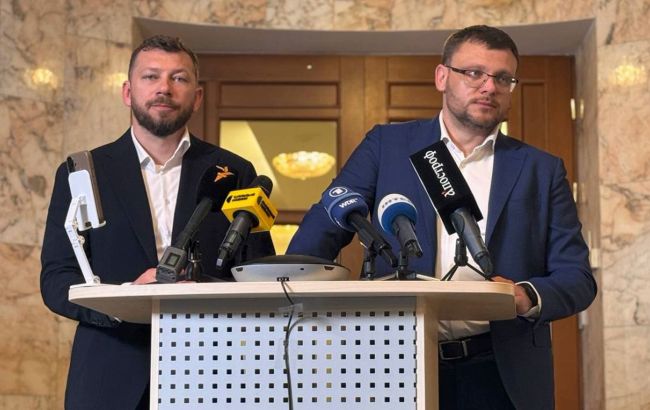Anti-corruption overhaul in Ukraine: What’s wrong with NABU and SAPO
 Anti-corruption overhaul: What’s wrong with NABU and SAPO (photo: Yuliia Akymova, RBC-Ukraine)
Anti-corruption overhaul: What’s wrong with NABU and SAPO (photo: Yuliia Akymova, RBC-Ukraine)
Ukrainian Parliament - Verkhovna Rada - has supported a draft law that changes the balance of powers between key anti-corruption agencies. This refers to draft law No. 12414, which limits the powers of the National Anti-Corruption Bureau of Ukraine (NABU) and the Specialized Anti-Corruption Prosecutor's Office (SAPO). Several amendments have also been proposed for the second reading, which would transfer part of these agencies' powers to the Prosecutor General.
The Bureau has already spoken out against the draft law, claiming that the head of SAPO will become a nominal figure and NABU will lose its independence. What led to the Parliament's initiative, and whether it is truly necessary, read in the article by RBC-Ukraine.
Essence of the draft law
Formally, draft law No. 12414 aims to regulate procedures for notifying individuals of suspicion, but the amendments proposed for the second reading could fundamentally change the architecture of the anti-corruption system.
In particular, it refers to the return of certain powers to the Prosecutor General's Office — primarily the authority to approve suspicions, which previously belonged exclusively to SAPO.
At the same time, the powers of the NABU director in terms of procedural oversight in top corruption cases may also be limited — effectively reducing the Bureau's role to that of an operational contractor with no influence throughout its investigations.
According to the agency itself, the SAPO head would become a figure with no real influence over decision-making, while key supervisory functions would revert to the Prosecutor General's Office.
Why now
According to members of parliament, a number of political and reputational concerns have accumulated around NABU and SAPO in recent months.
For example, the high-profile case of former Supreme Court head Vsevolod Knyazev, who was caught taking a $2.7 million bribe, failed to reach court within the expected timeframe. Lawmakers began to question why NABU makes loud arrests but does not bring cases to verdicts.
Additionally, media have repeatedly reported that NABU and SAPO lack proper coordination, and in some investigations, detectives acted autonomously — contradicting the model of procedural oversight. This is also supported by public disagreements between the agencies. NABU Director Semen Kryvonos and SAPO Head Oleksandr Klymenko have not publicly commented on the conflict, but sources in anti-corruption structures speak of "parallel centers of decision-making."
Another complaint concerns frequent leaks from case files. Data from closed investigations sometimes appears in the media even before any procedural action takes place. In parliament, such leaks are called a tool of political pressure — both on individuals involved and on the law enforcement bodies themselves.
Tensions escalated further when NABU began investigations into sitting members of parliament. One particularly discussed case involved an MP from the Servant of the People party suspected of real estate fraud. In response, some MPs accused the Bureau of selective justice.
The culmination of these concerns was an incident that occurred after the announcement of draft law No. 12414. On July 22, the Security Service of Ukraine (SBU) arrested Viktor Husarov, a member of NABU’s elite D-2 unit. According to preliminary data, he had been spying for the FSB and passing on identification data of law enforcement officers and other citizens from closed databases. The security service recorded over 60 instances of transmitting sensitive information.
Defense sector as a blind spot
Concerns also persist about NABU's effectiveness in overseeing defense procurement. During a full-scale war, when supplying the military is of critical importance, NABU officially reported just one suspicion related to the defense sector in 2023. In 2024, there were none at all.
In contrast, the most high-profile cases involving embezzlement in ammunition procurement, defective weapons, or substandard uniforms are being investigated by the SBU, the State Bureau of Investigation (DBR), or uncovered by investigative journalists.
Reputational scandals
The issues extend beyond inactivity. Several cases cast direct doubt on the impartiality or professionalism of individual NABU employees.
One of the most notable is the 2019 "Svynarchuk-gate" scandal, when journalists at Bihus.Info revealed an investigation into smuggling spare parts for defense enterprises. According to Tetiana Kozachenko, a former member of NABU's disciplinary commission (2018–2020), NABU detective Dmytro Lytvynenko was involved in the scheme and had been the subject of SBU criminal cases, including for state treason. Despite public calls from the heads of SAPO, DBR, and the Prosecutor General's Office to prosecute him, the case was closed.
Investigators found he was in contact with the scheme's organizers, including Ihor Hladkovskyi, son of the then-deputy secretary of the National Security and Defense Council. Lytvynenko was not only familiar with the suspects, but, according to the investigation, provided informational support — including updates on ongoing inquiries. Although the SBU opened a criminal case in 2019, including on charges of treason, it was later closed. Public demands from top law enforcement officials were left unanswered.
Lytvynenko’s name also surfaced in a case regarding a contract to modernize AN-32 aircraft for India. In 2014–2015, delivery delays jeopardized the nearly $400 million deal. NABU’s investigation and detectives' attempts to directly contact Indian officials — without extraterritorial authority — sparked an international scandal that made headlines in Indian and Russian media. The contract was salvaged only due to diplomatic intervention.
Another controversial case involved Pavlo Barbul, former head of Spetstechnoexport. While still in office, Barbul publicly spoke of pressure from law enforcement. In December 2017, NABU opened a criminal case, accusing him of misappropriating state property in connection with a 2009 Indian contract. Investigators claimed that the state-owned 410 Civil Aviation Plant paid commission fees to a foreign intermediary, which they considered misappropriation of funds.
Although detectives accused him of embezzlement, official state examinations (State Audit Service, forensic institutes) found no losses. Court experts also reported pressure from NABU investigators. Simultaneously, media launched an active campaign to discredit the suspects, which later had to be challenged or blocked in court.
In one related case, Barbul and his family were allegedly subjected to illegal surveillance. This became the subject of a separate investigation by Pecherskyi District Police Department in Kyiv. However, the case’s outcome remains unknown: no results have been made public, and no indictment was submitted to court.
Despite the expert findings, some SAPO representatives continued to publicly assert Barbul's guilt as fact — even before the trial concluded. According to the defendants, this severely damaged not only the company’s reputation but also Ukraine’s national interests abroad.
A wave of media publications supporting the prosecution’s position also emerged. Some were later legally challenged — and certain materials were deemed to contain unverified information, their distribution prohibited by court rulings. Pavlo Barbul filed lawsuits to defend his honor, dignity, and business reputation, some of which were successful. Certain outlets that previously maintained a neutral tone later changed their coverage.
A similar situation occurred with Archer, a company producing night-vision devices for Ukraine's armed forces. After their accounts were frozen and searches conducted, the company had to relocate production to Czechia. Local police conducted their own investigation and found no violations. Archer’s management claims NABU's actions not only jeopardized state contracts but also posed reputational risks on the international market.
Additional questions surround the financial dealings of the detectives themselves. Journalistic investigations repeatedly mention the use of cryptocurrency, including fake wallets. Once again, Dmytro Lytvynenko's name appears — media reports claim he engaged in crypto brokerage operations. The origin of more than 1.5 million UAH in his possession remains unexplained.
Such cases paint a troubling picture — not only in terms of reputation but also national security. In wartime, the country cannot afford an anti-corruption agency that shows no interest in systemic oversight of the defense sector or whose actions harm the state.
Control or reset
The question of NABU's effectiveness is not just an internal Ukrainian issue. In May 2025, NABU underwent its first external audit. According to international experts, the Bureau scored 1.4 out of 3 possible points.
Among the problems: weak analytical work, lack of technical capabilities, and ineffective communication. At the same time, the audit did not find gross violations by leadership.
These findings and the aforementioned facts suggest that Ukraine's anti-corruption system truly needs reform. But whether that should involve reducing powers, regulating them more clearly, or a complete reset — remains an open question. In the context of European integration and post-war recovery, the balance between effectiveness and independence could be the key to public and international trust.

